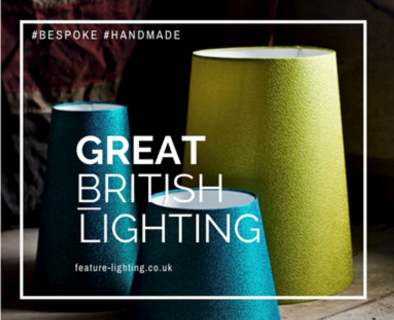From Handmade to High Tech - Feature Lighting

30th May 2025
Based in Pendle, Feature Lighting design and manufacture British-made bespoke lampshades and light fittings in a wide range of shapes, sizes and materials. Each product is made to order, with clients ranging from high street retailers and furniture/soft furnishings brands to architects, interior designers, restaurants and hotels.
As demand grew, so did the pressure on their production process. Every order is unique, which means each component needs to be individually measured, marked and cut. For years, this was all done by hand.
“I’ve done the maths on the floor with a pencil and a bit of string more times than I care to count,” says Jacqui, founder of Feature Lighting. “Some of our shades have a curve radius of four metres, so it takes a huge amount of space and time just to mark things out. It’s very physical, very manual and very slow. You start to realise something needs to change.”
That realisation became unavoidable when the business secured an order for 1,200 lampshades for a Manchester apartment block.
“We were able to complete the order by outsourcing some of the cutting, but I knew that this had to be achievable in-house. Orders like this would keep coming, and we needed a way to manage them without burning out.”
Jacqui knew a solution was needed, but the route forward wasn’t clear.
“I just had no idea what it was or where to start, and I also had no CAD skills, so I really wasn’t sure how I was going to implement something to help speed things up.”
That’s when she got in touch with Steve Wilkinson, Specialist Manufacturing Advisor at RTC North, through the UK SPF Pendle Business Manufacturing Programme.
With a background in engineering and manufacturing, Steve acted as a sounding board, helping Jacqui assess her options and identify a more efficient way of working that would support growth without compromising the craftsmanship the business was built on.
“I already knew Steve, so I felt comfortable picking up the phone,” Jacqui says. “He didn’t just nod along, he made sense of the options, helped me think clearly about what the business needed, and talked me through all the possibilities. Honestly, I think I would’ve talked myself out of the investment without that support.”
Together, they explored a variety of machinery, from low-cost kits to advanced industrial models. Steve also helped Jacqui access funding support through Pendle Council to make the investment possible.
“He even came with me to see the machines and test them with my materials, we asked so many questions,” Jacqui recalls. “In the demo, we programmed 12 large shades in a couple of minutes and cut them in less than five. Just a few days before, that exact job had taken me a full day by hand. It blew my mind.”
Beyond improving cutting times, the chosen machine also came with an unexpected bonus – the ability to cut and crease cardboard.
Feature Lighting produce lampshades in a huge variety of shapes and sizes, which makes packaging a challenge. Standard boxes rarely fit, and packing has often involved fiddly, time-consuming solutions and a fair amount of plastic.
“This opens up the possibility of creating our own bespoke packaging in-house,” says Jacqui. “It’ll cut down on plastic use, reduce packing time, and even helps us future-proof against EU packaging regulations if we start exporting.”
Since installing the machine, the benefits have been wide-ranging. It is now a central part of production, freeing up time, reducing manual processes and enabling the team to focus on more skilled and creative work, whilst also inspiring some new designs that just weren’t possible before.
It has also shifted how the business is perceived. With improved efficiency and capacity, Feature Lighting are now in conversations with larger-scale clients who may previously have assumed they were too small to handle their needs.
“We’ve had brilliant feedback already,” Jacqui says. “It’s helped us move conversations forward with businesses who now recognise we’ve got the capacity, skills and ambition to handle their orders. And it’s given me space to think about new ideas. Honestly, my mind is overflowing.”
That same mindset is something Jacqui has carried from the very beginning. Back in 1999, she taught herself to code and built her first website from scratch to support her designer lighting business. That determination to take ownership, learn and adapt is a thread that runs right through Feature Lighting’s story – and a real testament to her can-do attitude.
Looking ahead, the next phase is all about growing the business’s direct-to-consumer offering.
“The B2C side of the business is something I’m really keen to develop through the website and various platforms,” Jacqui adds. “The goal is to establish Feature Lighting as a recognised British lighting brand in its own right.”
With innovation at the core of what they do, and the right support in place, we are excited to see what comes next.
